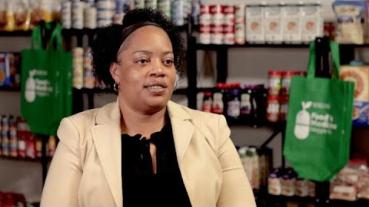Harrison I. Steans was a forward-thinking entrepreneur known throughout Chicago’s banking community for his sharp intellect and prolific deal-making, yet he was just as engaged in his charitable work, particularly on Chicago’s West Side. For nearly four decades, Harrison — who passed away in 2019 at age 83 — promoted equity in education by founding a charter school in North Lawndale, sponsoring elementary school students along their journey to college and mentoring young people.
“My dad believed that personal interaction and connection are what change people’s lives,” says Harrison’s daughter Jennifer Steans, a Rush University Medical Center trustee since 2014 and chair of its Health Equity Advisory Council. “He got to know the kids one-on-one, and he would always say he got a lot more out of it than the kids did.”
 To honor Harrison’s legacy, the Steans, Morrison and Hunter families made a generous $5 million gift to Rush to establish an endowed directorship for the RUSH BMO Institute for Health Equity. Nationally recognized health equity expert John Rich, MD, MPH, was recently named the Harrison I. Steans Director of the RUSH BMO Institute for Health Equity at Rush University. The Institute was established in 2021 through a $10 million donation from BMO Financial Group.
To honor Harrison’s legacy, the Steans, Morrison and Hunter families made a generous $5 million gift to Rush to establish an endowed directorship for the RUSH BMO Institute for Health Equity. Nationally recognized health equity expert John Rich, MD, MPH, was recently named the Harrison I. Steans Director of the RUSH BMO Institute for Health Equity at Rush University. The Institute was established in 2021 through a $10 million donation from BMO Financial Group.
“So much of what Rush and the Institute are doing epitomizes what my dad was all about,” Jennifer says. “Rush is fortunate to have Dr. Rich as the first director of the Institute, and we’re excited about his vision to ensure that everybody has access to high-quality health care, no matter where you live.”
‘A strong work ethic, stewardship and social responsibility’
Harrison’s worldview was shaped by three core values passed on from his grandfather, a Presbyterian minister. “A strong work ethic, stewardship and social responsibility are still central to how our family operates, including all three family lines,” says Jennifer, who is also president and CEO of Financial Investments Corp., the Chicago-based private equity firm she founded with Harrison in 1994.
Decades before equity issues were in the spotlight, Harrison had his own vision for revitalizing communities suffering from long-term disinvestment by bringing in banks that could help create a new generation of business owners. “He believed one way to reduce the wealth gap was to even the playing field through entrepreneurship,” Jennifer says.
Harrison formed Illinois’ first single-bank holding company to buy the Hyde Park Bank & Trust on the South Side in 1967. Over the next two decades, the holding company grew to include six banks until it was sold to NBD Bancorp, now part of J.P. Morgan Chase. In another major deal, Harrison and other investors acquired LaSalle National Bank, where he served as chairman for five years.
During his storied career, Harrison formed deep ties with David Casper, U.S. CEO of BMO Financial Group, through both men’s civic and charitable work. He also partnered with executives from Harris Bank (which was later acquired by BMO) on many philanthropic projects to reverse the generational poverty in North Lawndale.
“My father was always a huge believer that banks can only be as successful as the communities in which they thrive,” Jennifer says.
‘A sense of justice’
The roots of the Steans, Morrison and Hunter families’ shared commitment to philanthropy began four generations ago when Harrison married Lois Morrison; Harrison’s sister, Adeline, married Lois’ brother, Harold; and Lois’ sister, Maxine, married Thomas Hunter III.
In 1987, Harrison and Lois, along with their three daughters — Jennifer, Heather and Robin — co-founded the Steans Family Foundation, and ever since it has remained focused on revitalizing the North Lawndale community. Meanwhile, the Harold M. and Adeline S. Morrison Family Foundation has long supported environmental causes and outdoor environmental education for underserved communities. In addition, the Hunter Family Foundation has focused on advancing equity through education, health care, environmental protection and economic development.
The families’ gift to establish the endowed directorship in Harrison’s name will support current and future strategies at Rush to improve health outcomes across Chicago and is among their largest donations to date. While several family members received medical care at Rush in the past, it was the institution’s longstanding commitment to narrowing the life expectancy gap between Chicago’s downtown and West Side residents that cemented the families’ decision to create the endowed directorship at Rush, says Heather Steans, Harrison’s daughter and president of the Steans Family Foundation’s board of trustees.
“Our dad always had a sense of justice that he ingrained in us,” Heather explains. “He wanted to change the system so that privilege isn’t so narrowly focused on so few people. Rush’s values align very closely with ours, in terms of being focused on equity issues on the West Side, where we’ve had a longstanding interest in trying to promote equity.”
Heather, a former state senator for Illinois’ 7th District for 12 years, sees the RUSH BMO Institute for Health Equity as an example of how private foundations, the business community and health care organizations can work together to find creative ways to improve health equity and encourage more innovation in government programs like Medicaid and Medicare. “The research base and health care delivery innovations that Rush can bring to the table are just enormous and will have a lot of positive outcomes,” she says.
‘A force of nature’
Harrison’s commitment to tackling issues caused by systemic racism not only inspired his family but also others who were captivated by his booming voice, infectious laugh and dedication to do what was right.
“Harrison was a force of nature,” says Patricia Ford, executive director of the Steans Family Foundation. “He was always asking, ‘How can we do more?’ And every time he learned more, he did more.”
One of Harrison’s favorite charitable projects was sponsoring Chicago’s first “I Have a Dream” class, modeled after a similar program in New York. Beginning in 1987, the foundation took a family-centric approach to support sixth-grade students in two North Side schools to help them graduate and go on to college. Students not only benefitted from financial aid but also mentoring, help with finding summer jobs and social support.
Then in 1998, Harrison wanted to make a broader impact at the community level, specifically focusing on Chicago’s North Lawndale neighborhood. He was a founder of North Lawndale College Preparatory High School, which has also benefited from support from the Morrison and Hunter families over the years. Harrison was also the visionary behind the Phoenix Pact, which provides college scholarships to students from NLCP who earn at least a B average. Today, about 80% of NLCP students go on to college, nearly double the overall rate for Chicago Public Schools.
Ford believes the families’ significant gift to Rush to create equitable health outcomes will carry on Harrison’s legacy of high-impact investment in North Lawndale and other West Side neighborhoods. “There is a confluence of factors that are knit together that need to be improved to transform a community, and health equity is right up there,” she says.
In keeping with Harrison’s vision, the families also remain committed to empowering and collaborating with residents at a grass-roots level to promote better education, employment, health and safety in North Lawndale and other areas historically shaped by structural racism, his daughters say.
“His philanthropy is our philanthropy,” Jennifer says. “It’s all one family mission. And my dad really believed that the more you have, the more responsibility you have to help others.”
Read more about the legacy of Harrison I. Steans.
Related story




